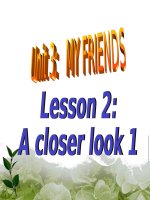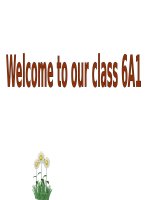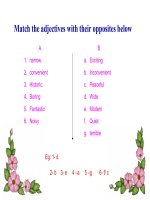English 9 unit 1 local environment lesson 2 a closer look 1
Bạn đang xem bản rút gọn của tài liệu. Xem và tải ngay bản đầy đủ của tài liệu tại đây (2.8 MB, 16 trang )
GOOD AFTERNOON
EVERYBODY
WELCOME
TO OUR CLASS
Lesson 2
A
A closer
closer look
look 11
Unit 1: Local
Environment
GAMES
Handicrafts
Brainstorming
traditional handicraft
paintings
conical hats
drums
marble sculptures
Handicrafts
lanterns
Potery
silk
lacquerware
I. Vocabulary:
Carve [ kɑːv] (v):
Khắc, chạm, tạc, đục
Cast [kɑːst] (v):
Đúc, trải, sắp xếp
Weave [wiːv] (v):
Đan (rổ rá), dệt (vải)
Embroider [ɪmˈbroɪdə] (v): Thêu
Knit [nɪt] (v)
Mould [məʊld]
Đan (len, sợi...)
Đổ khuôn, tạo khuôn
Carve
1. Match the verbs with the pictures
Cast
Weave
Embroider Knit
A. .........................
B. .........................
Mould
C. .........................
D. ................... E. ................... F. ................... G. ...................
2a. Match the verbs in column A with the group of nouns
in column B
A
1. Carve
2. Cast
3. Weave
4. Embroider
5. Knit
6. Mould
B
a. handkerchiefs, tablecloths, pictures
b. stone, wood, eggshells
c. clay, cheese, chocolate
d. bronze, gold, iron
e. baskets, carpet, silk, cloth
f. sweaters, toys, hats
2b. Match the verbs in column A with the group of
nouns in column B
Infinitive
1. to carve
2. to cast
Past tense
Past participle
I carved it.
It was carved.
I ...................... it. It
was ......................
cast
cast
3. to weave
I ......................
it.
It
wove
woven
was ......................
embroidered
embroidered
4. to embroider I ...................... it. It
knited
knited
was ......................
5. to knit
I ......................
moulded it. It
moulded
was ......................
3. Places of interest
Entertaining
- cinema
Educational
- library
Places of
interest
Cultural
- Opera house
Historical
- building
4. Complete the passage by filling suitable words.
atraction historical traditional handicrafts culture exercise
Some people say that a place of interest is a place famous for its
scenery or a well-known (1) .............................. Site. I don’t think
it has to be so limited. In my opinion, a place of interest is simply
one that people like going to.
In my town, the park is a(n) (2) ................................ because
many people love spending time there. Old people do
(3) ........................... and walk in the park. Children play games
there while their parents sit and talk with each other. Another
place of interest in my town is Hoa Binh market. It’s a(n)
(4) ............................ market with a lot of things to see. I love to
go there to buy food and clothes, and watch other people buying
and selling. Foreign tourists also like this market because they can
experience the (5) ............................ of Vietnamese people, and
buy woven cloth and other (6) ................................. as souvenirs.
Pronunciation
5a. Listen then answer the questions.
1. Which words are louder and clearer than the others?
2. What kinds of words are they?
3. Which words are not as loud and clear as the others
4. What kinds of words are they?
5a. Answerkey
1. Which words are louder and clearer than the others?
1. craft, village, lie, river bank
2. painting, embroidered
3. What, region, famous
4. drums, aren’t, made, village
5. famous, artisan, carved, table, beautifully
2. What kinds of words are they?
They are: nouns, verbs, adjective, adverbs, wh-question
words, and negative auxiliaries.
3. Which words are not as loud and clear as the others
3. is, this, for
2. this, is
1. the, on, the
5. a, this
4. in, my
4. What kinds of words are they?
They are: articles, prepositions, pronouns, and possessive
adjectives.
Remember
6. Underline the content word in the sentences.
1. The Arts Museum is a popular place of interest in
my city.
2. This cinema atracts lots of youngsters.
3. The artisans mould clay to make traditional pots.
4. Where do you like going at weekend?
5. We shoudn’t destroy historical buildings.
HOMEWORK
1.Write newwords.
2.Prepare lesson 3: A closer look 2
3.Do exercises in workbook.
See you next time









